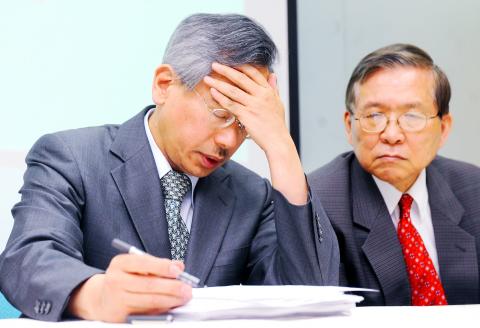Children who drank beverages contaminated with di(2-ethylhexyl) phthalate, or DEHP, on a long-term basis are susceptible to reproductive dysfunctions, a medical research center said yesterday.
Children who consume 350ml of tainted fluid containing 12 parts per million (ppm) of DEHP on a daily basis for 12 consecutive months are six to eight times more at risk of developing problems with their reproductive system when they become adults, recent research by the National Health Research Institutes showed.
Institute president Kenneth Wu (伍焜玉) said DEHP is suspected to be an endocrine disruptor, which could lead to the shrinking in size of the penis and testicles in men and thyroid dysfunction.

Photo: Liao Chen-huei, Taipei Times
DEHP’s effect on children is magnified, because the concentration of the harmful chemical is higher in persons with a lower body mass.
“The health risk of an adult consuming the same amount of DEHP beverage is reduced by half,” Wu said.
The result was based on statistics from a US study in the 1980s that tested DEHP on rats.
“We are not yet sure of the health risks of DEHP on humans because little academic information was found,” Wu said. “But we hope that the incident can help us understand more of the hazard’s ratio.”
Wu said that since DEHP is released from the body naturally within five to 12 hours, the health risks for infrequent consumers are relatively low.
Nevertheless, Liou Saou-hsing (劉紹與), director of the institute’s division of Environmental Health and Occupational Medicine, said that toxic residues might be left in the body once DEHP is eliminated.
Parents who suspect their children may have been harmed by excessive DEHP intake should take their children to the doctor for a checkup, Lin said.
Asked whether DEHP could cause cancer, Wu said there was a lack of research on a large human sample at home and abroad to confirm this.
“This is the first time in the world that so many people have consumed DEHP-tainted drinks,” he said, adding that most research in the US and Europe only focus on small-scale exposures in the environment.
DEHP is classified as Group 2B, or possibly carcinogenic to humans, according to the International Agency for Research on Cancer.
Taiwan is now working with epidemiologists to come up with a two-year, mass questionnaire to trace the health risks of DEHP consumption, Wu said.

Chinese spouse and influencer Guan Guan’s (關關) residency permit has been revoked for repeatedly posting pro-China videos that threaten national security, the National Immigration Agency confirmed today. Guan Guan has said many controversial statements in her videos posted to Douyin (抖音), including “the red flag will soon be painted all over Taiwan” and “Taiwan is an inseparable part of China,” and expressing hope for expedited reunification. The agency last year received multiple reports alleging that Guan Guan had advocated for armed reunification. After verifying the reports, the agency last month issued a notice requiring her to appear and explain her actions. Guan

GIVE AND TAKE: Blood demand continues to rise each year, while fewer young donors are available due to the nation’s falling birthrate, a doctor said Blood donors can redeem points earned from donations to obtain limited edition Formosan black bear travel mugs, the Kaohsiung Blood Center said yesterday, as it announced a goal of stocking 20,000 units of blood prior to the Lunar New Year. The last month of the lunar year is National Blood Donation Month, when local centers seek to stockpile blood for use during the Lunar New Year holiday. The blood demand in southern Taiwan — including Tainan and Kaohsiung, as well as Chiayi, Pingtung, Penghu and Taitung counties — is about 2,000 units per day, the center said. The donation campaign aims to boost

A preclearance service to facilitate entry for people traveling to select airports in Japan would be available from Thursday next week to Feb. 25 at Taiwan Taoyuan International Airport, Taoyuan International Airport Corp (TIAC) said on Tuesday. The service was first made available to Taiwanese travelers throughout the winter vacation of 2024 and during the Lunar New Year holiday. In addition to flights to the Japanese cities of Hakodate, Asahikawa, Akita, Sendai, Niigata, Okayama, Takamatsu, Kumamoto and Kagoshima, the service would be available to travelers to Kobe and Oita. The service can be accessed by passengers of 15 flight routes operated by

The Central Weather Administration (CWA) said a magnitude 4.9 earthquake that struck off the coast of eastern Taiwan yesterday was an independent event and part of a stress-adjustment process. The earthquake occurred at 4:47pm, with its epicenter at sea about 45.4km south of Yilan County Hall at a depth of 5.9km, the CWA said. The quake's intensity, which gauges the actual effects of a temblor, was highest in several townships in Yilan and neighboring Hualien County, where it measured 4 on Taiwan's seven-tier intensity scale, the CWA said. Lin Po-yu (林柏佑), a division chief at the CWA's Seismological Center, told a news conference